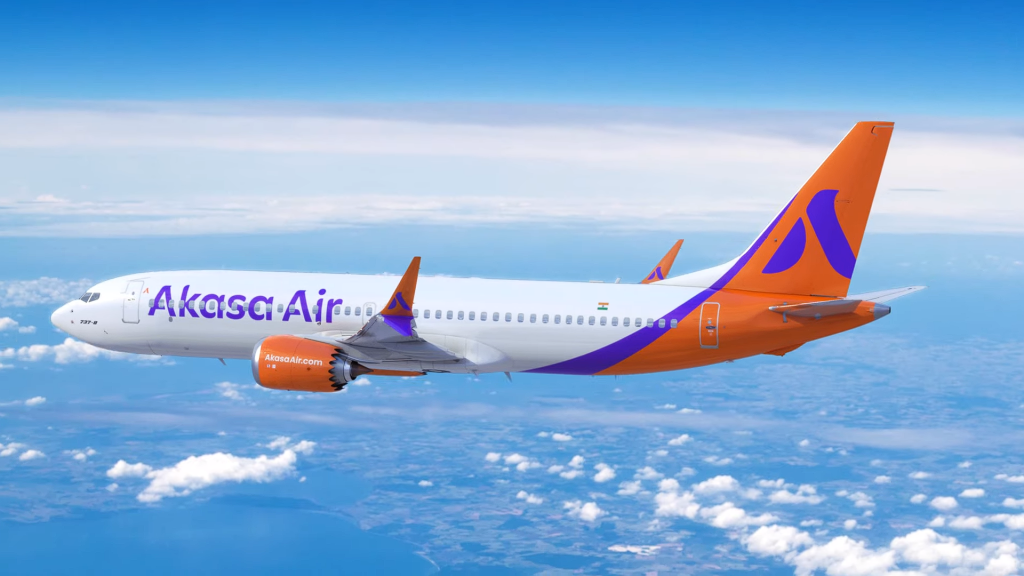Background
Akasa Air, a subsidiary of SNV Aviation Private Limited, is a Mumbai-based Indian budget airline. It was established by Vinay Dube and Aditya Ghosh, with the late Rakesh Jhunjhunwala (1960–2022) holding a 46% stake in the company. Presently, Akasa Air operates a fleet of 20 aircraft serving 16 goals, and they have placed orders for an additional 56 aircraft.

The Fiasco
Shortly after celebrating its first anniversary, Akasa Air, the latest addition to India’s dynamic aviation industry, faced a sudden surge in flight cancellations, prompting passenger complaints on social media. Passengers took to WhatsApp to voice their concerns, noting the frequent and abrupt flight cancellations.
On September 20, the airline took an unusual step by filing a lawsuit against five pilots in the Bombay High Court, seeking a staggering ₹21 crore in damages from each pilot. Akasa Air claimed that these pilots had resigned without adhering to the specified notice period in their contracts, leaving the airline in a lurch. The airline’s spokesperson emphasized that the pilots had departed without even providing a 24-hour notice.
This aggressive and controversial move by Akasa Air raised eyebrows within the aviation industry, leading to criticism from pilot unions and rival airlines. Many considered the airline’s actions immature, absurd, and hypocritical. Furthermore, it sheds light on peculiarities in the operations of airlines and regulators in India.
The pilot community reacted with anger, with several IndiGo and other airline pilots defending the targeted five. They pointed out that Akasa had recruited many pilots from competitors like SpiceJet, Go First, and Air India Express when it launched, rather than investing in extensive training. In fact, SpiceJet confirmed that around 44 of its pilots, including 3 first officers, had joined Akasa without serving notice periods, a move facilitated by SpiceJet’s reduced flight operations at the time.
This episode unveiled not only the challenges in the Indian aviation sector but also the complexities surrounding pilot mobility and contracts within the industry.

Survival Strategy
To the airline’s benefit and credit, the absence of any pandemic baggage at launch helped it establish the quickest rate of industry development among private competitors in a highly competitive environment. It increased to a fleet of 20 aircraft in its first year, compared to IndiGo, India’s top private airline, which only had a fleet of 12 at that time.
The choice of route has also been given more care than usual. In fact, it has imitated IndiGo’s strategy of entering a market, increasing frequencies to get to number 2 or 3 in this aspect, and connecting the dots within the network instead of opening new stations with one or two flights.
Now in order to survive the current crisis the airline has taken steps. The airline is now preparing to begin operating international flights for which it has received regulatory approval,
with a planned debut date of December and a concentration on the Middle East area, according to reports in The Economic Times.
As Akasa Air looks to develop outside of India, its introduction into overseas routes is regarded as an important milestone. Similar to IndiGo, the top management of the airline has maintained a low profile and a focus on operational performance, as opposed to the frequent controversies associated with the initial directors of AirAsia India.
Despite its current difficulties, Akasa Air remains steadfast in its determination to overcome the current challenges. The Indian airline sector is expected to experience a significant expansion in the near future. Akasa Air is well-prepared for the long-term prospects and is confident in its capacity to grow. The pilot shortage remains a major issue, however, the airline is taking measures to rectify it and remain competitive in the market.

Leave a comment